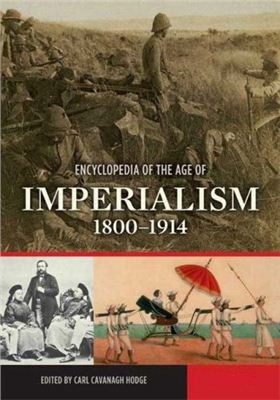Greenwood Press, 2007. - 1016 p.
In 1800, Europeans goveed about one-third of the world's land surface; by the start of World War I in 1914, Europeans had imposed some form of political or economic ascendancy on over 80 percent of the globe. The basic structure of global and European politics in the twentieth century was fashioned in the previous century out of the clash of competing imperial interests and the effects, both beneficial and harmful, of the imperial powers on the societies they dominated.
This encyclopedia offers current, detailed information on the major world powers of the nineteenth century and their global empires, as well as on the people, events, and ideas, both European and non-European, that shaped the Age of Imperialism.
Besides detailed entries that describe the formation, structure, and influence of the economic and territorial empires built by Great Britain, France, Germany, Austria-Hungary, Russia, Japan, the Ottoman Turks, and the United States prior to World War I, the encyclopedia also offers entries on such important figures as: Joseph Chamberlain; Georges Clemenceau; Mustapha Kemal; Alexander Kerensky; Rudyard Kipling; Hirobumi Ito; Helmuth von Moltke; Ibn Saud
Other entries cover such important events as the following: Battle of Blood River; Boxer Insurrection; Congress of Berlin; Fashoda Incident; Italo-Turkish War of 1911-12; Jameson Raid
And still other entries cover such countries, treaties, alliances, and movements as: Egypt; Entente Cordiale; German Confederation; Guinea; Jadidism; India; Treaty of Inkiar Skelessi
Besides over 800 clearly written and highly informative entries, the encyclopedia includes primary documents, a chronology, and extensive introductory essay, a bibliography, a guide to related topics, and a series of useful maps.
In 1800, Europeans goveed about one-third of the world's land surface; by the start of World War I in 1914, Europeans had imposed some form of political or economic ascendancy on over 80 percent of the globe. The basic structure of global and European politics in the twentieth century was fashioned in the previous century out of the clash of competing imperial interests and the effects, both beneficial and harmful, of the imperial powers on the societies they dominated.
This encyclopedia offers current, detailed information on the major world powers of the nineteenth century and their global empires, as well as on the people, events, and ideas, both European and non-European, that shaped the Age of Imperialism.
Besides detailed entries that describe the formation, structure, and influence of the economic and territorial empires built by Great Britain, France, Germany, Austria-Hungary, Russia, Japan, the Ottoman Turks, and the United States prior to World War I, the encyclopedia also offers entries on such important figures as: Joseph Chamberlain; Georges Clemenceau; Mustapha Kemal; Alexander Kerensky; Rudyard Kipling; Hirobumi Ito; Helmuth von Moltke; Ibn Saud
Other entries cover such important events as the following: Battle of Blood River; Boxer Insurrection; Congress of Berlin; Fashoda Incident; Italo-Turkish War of 1911-12; Jameson Raid
And still other entries cover such countries, treaties, alliances, and movements as: Egypt; Entente Cordiale; German Confederation; Guinea; Jadidism; India; Treaty of Inkiar Skelessi
Besides over 800 clearly written and highly informative entries, the encyclopedia includes primary documents, a chronology, and extensive introductory essay, a bibliography, a guide to related topics, and a series of useful maps.

